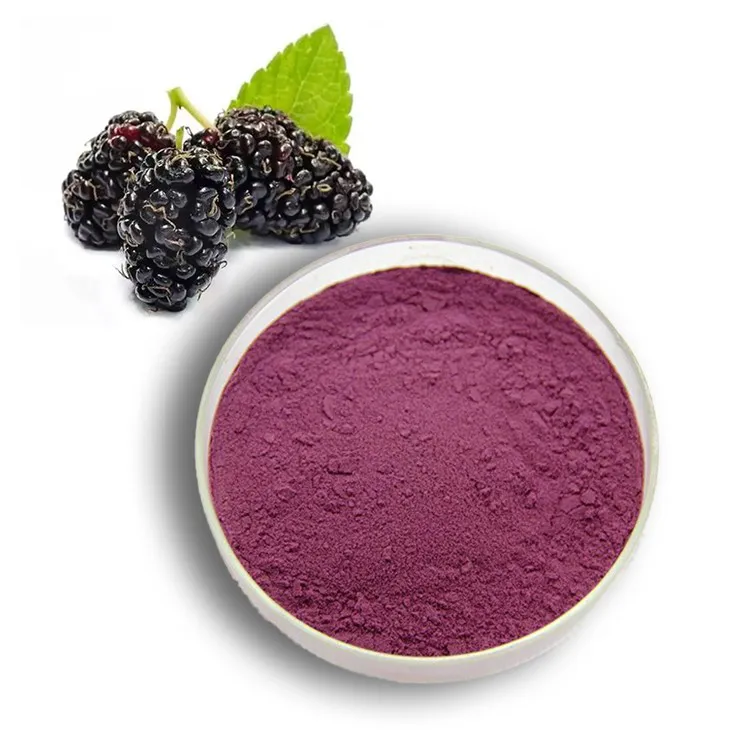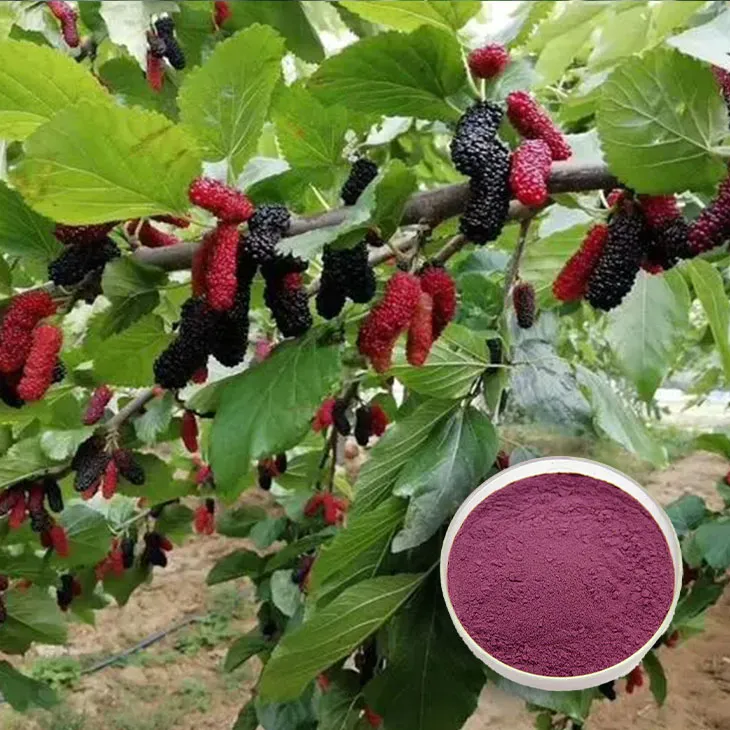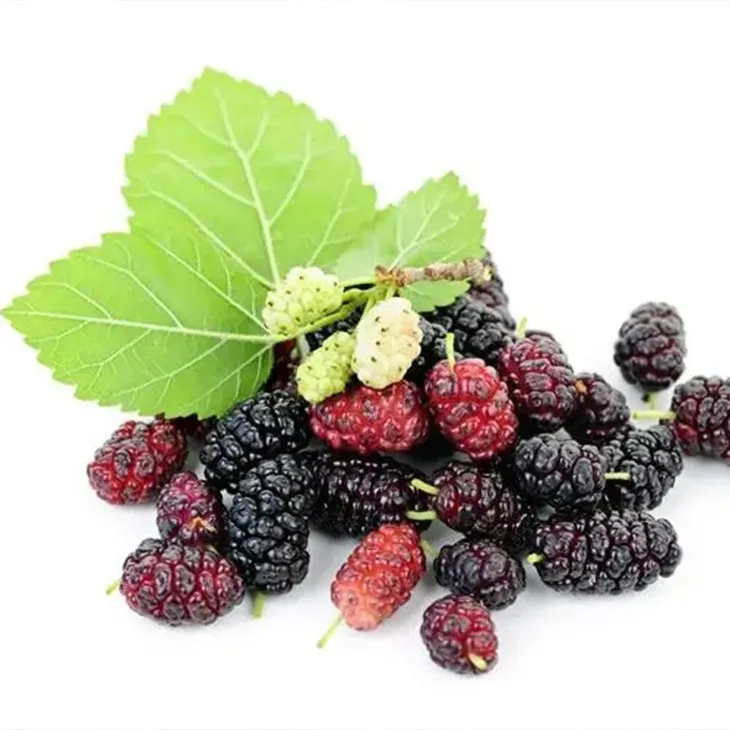- 0086-571-85302990
- sales@greenskybio.com
Commercial Advantages of Organic Mulberry Extract.
2024-12-21

1. Introduction
Organic Mulberry Extract has emerged as a highly valuable substance in various commercial sectors. Its natural origin and diverse properties offer a plethora of opportunities for different industries. This article will explore the commercial advantages of organic Mulberry Extract in the pharmaceutical, agricultural, and textile industries.

2. Pharmaceutical Advantages
2.1 Anti - inflammatory Properties
One of the significant aspects of organic Mulberry Extract in the pharmaceutical realm is its potential anti - inflammatory properties. Inflammation is a complex biological response that is associated with numerous diseases. Preliminary studies have indicated that the extract may contain compounds that can modulate the body's inflammatory response.
For pharmaceutical companies, this presents an exciting opportunity. New drugs are constantly being sought to address various inflammatory conditions such as arthritis, inflammatory bowel disease, and certain skin disorders. The development of drugs based on the anti - inflammatory properties of organic mulberry extract could be a new avenue for treatment. Moreover, it could also be used as a complementary treatment alongside existing medications.
2.2 Diversifying Product Portfolios
Pharmaceutical companies are always looking to diversify their product portfolios. With the increasing interest in natural and plant - based remedies, organic mulberry extract fits well into this trend. It can be used to develop new types of medications, dietary supplements, or even topical creams.
For example, a company could develop a supplement containing organic mulberry extract for consumers who are looking for natural ways to support their immune system or manage mild inflammation. This would not only attract new customers but also enhance the company's reputation for innovation and responsiveness to consumer demands.

3. Agricultural Advantages
3.1 Natural Biostimulant
In the agricultural sector, organic mulberry extract has shown great promise as a natural biostimulant. A biostimulant is a substance that can enhance plant growth and development without being a traditional fertilizer.
When applied to crops, organic mulberry extract can influence various physiological processes in plants. For instance, it may improve the uptake of nutrients from the soil. This is crucial as it can help plants make better use of the available resources, resulting in healthier growth.
3.2 Pest and Disease Resistance
Another advantage of using organic mulberry extract in agriculture is its potential to improve a plant's resistance to pests and diseases. Plants are constantly under threat from various pests and pathogens, and the use of chemical pesticides and fungicides has raised concerns regarding environmental and human health.
Studies have suggested that the extract may contain certain compounds that can activate the plant's natural defense mechanisms. This means that plants treated with organic mulberry extract may be better able to fend off attacks from insects, fungi, and other harmful organisms. For example, it could induce the production of certain proteins in plants that are toxic to pests or enhance the plant's physical barriers against pathogen entry.
3.3 Yield Increase
The overall impact of using organic mulberry extract on crop yield is also significant. By promoting better growth, nutrient uptake, and pest and disease resistance, it can lead to an increase in the quantity and quality of the harvested crops.
Farmers stand to benefit greatly from this. Higher yields mean more income, and with the added advantage of using a natural and sustainable product like organic mulberry extract, it also aligns with the growing consumer preference for sustainably produced food. Additionally, it can contribute to food security by ensuring a more stable supply of agricultural products.
3.4 Sustainable Farming
Organic mulberry extract plays an important role in sustainable farming practices. Sustainable agriculture aims to meet the present needs for food and fiber while conserving the environment and natural resources for future generations.
Using organic mulberry extract as a biostimulant reduces the reliance on synthetic fertilizers and pesticides. This helps in minimizing the negative impacts of agricultural activities on the soil, water, and air. It also promotes biodiversity on the farm as it does not harm beneficial insects and organisms in the same way that chemical pesticides do.

4. Textile Advantages
4.1 Natural Dyeing
The textile industry has a long - standing relationship with mulberry - related products, and organic mulberry extract offers unique advantages in the area of natural dyeing.
As the demand for eco - friendly and sustainable textile products has been on the rise, traditional synthetic dyes are facing increasing scrutiny due to their environmental impact. Organic mulberry extract, on the other hand, provides a natural alternative for dyeing fabrics.
It can produce a wide range of beautiful and natural - looking colors on different types of fabrics. For example, it can create soft earthy tones or vibrant hues depending on the extraction and dyeing processes used. These natural colors are not only aesthetically pleasing but also appeal to environmentally - conscious consumers who are looking for products that are more sustainable throughout their lifecycle.
4.2 Unique Selling Point
For textile manufacturers, using organic mulberry extract as a dye can be a significant unique selling point. In a highly competitive market, products that can differentiate themselves based on sustainability and naturalness are likely to gain a competitive edge.
Brands can market their textiles as being dyed with organic mulberry extract, highlighting the natural and eco - friendly aspects of the product. This can attract consumers who are willing to pay a premium for products that are in line with their values, such as environmental protection and support for sustainable practices.
5. Conclusion
Organic mulberry extract offers a wide range of commercial advantages across the pharmaceutical, agricultural, and textile industries. In the pharmaceutical industry, its potential anti - inflammatory properties and ability to diversify product portfolios are valuable. In agriculture, it serves as a natural biostimulant, improves pest and disease resistance, increases yield, and promotes sustainable farming. In the textile industry, it provides a natural dyeing option and a unique selling point for sustainable products.
As consumer awareness regarding health, environmental protection, and sustainability continues to grow, the commercial potential of organic mulberry extract is likely to be further explored and exploited. Industries should look to capitalize on these advantages to meet the changing demands of the market and contribute to a more sustainable and prosperous future.
FAQ:
What are the anti - inflammatory properties of organic mulberry extract?
While preliminary studies suggest that organic mulberry extract may have anti - inflammatory properties, the exact mechanisms are still being researched. However, it shows potential in this area, which could be beneficial for pharmaceutical development or complementary treatments.
How can organic mulberry extract be used as a natural biostimulant in agriculture?
When applied to crops, organic mulberry extract can enhance plant growth, improve resistance to pests and diseases, and increase overall yield. It likely contains nutrients or compounds that interact with the plants in a positive way, though more research is needed to fully understand the processes.
What are the benefits of using organic mulberry extract as a dye in the textile industry?
As the demand for eco - friendly and sustainable textile products is increasing, using organic mulberry extract as a dye provides a unique selling point. It can produce beautiful and natural - looking colors on fabrics, and it appeals to environmentally - conscious consumers.
How does organic mulberry extract help pharmaceutical companies diversify their product portfolios?
Since it has shown potential in medical research areas such as having anti - inflammatory properties, it can be an interesting option for pharmaceutical companies. They can use it for the development of new drugs or as a complementary treatment, thus diversifying their product offerings.
What makes organic mulberry extract suitable for sustainable farming?
Organic mulberry extract can be used as a natural biostimulant for plants. It helps enhance plant growth, improve pest and disease resistance, and increase yield. These factors contribute to more sustainable farming practices as they reduce the need for some chemical fertilizers and pesticides.
Related literature
- The Potential of Organic Mulberry Extract in Modern Medicine"
- "Organic Mulberry Extract: A Sustainable Solution for Agriculture"
- "Mulberry Extract in Textile Dyeing: An Eco - Friendly Approach"
- ▶ Hesperidin
- ▶ citrus bioflavonoids
- ▶ plant extract
- ▶ lycopene
- ▶ Diosmin
- ▶ Grape seed extract
- ▶ Sea buckthorn Juice Powder
- ▶ Beetroot powder
- ▶ Hops Extract
- ▶ Artichoke Extract
- ▶ Reishi mushroom extract
- ▶ Astaxanthin
- ▶ Green Tea Extract
- ▶ Curcumin Extract
- ▶ Horse Chestnut Extract
- ▶ Other Problems
- ▶ Boswellia Serrata Extract
- ▶ Resveratrol Extract
- ▶ Marigold Extract
- ▶ Grape Leaf Extract
- ▶ blog3
- ▶ blog4
- ▶ blog5
-
Pure 85% Tomentil Extract.
2024-12-21
-
Garcinia Cambogia Extract
2024-12-21
-
Sea buckthorn oil
2024-12-21
-
Carrageenan Extract Powder
2024-12-21
-
Rosemary extract
2024-12-21
-
Bamboo Leaf extract
2024-12-21
-
Fenugreek Extract Powder
2024-12-21
-
Milk Thistle Extract
2024-12-21
-
Dandelion Root Extract
2024-12-21
-
Curcuma Longa Extract
2024-12-21
-
Yellow Pine Extract
2024-12-21





















